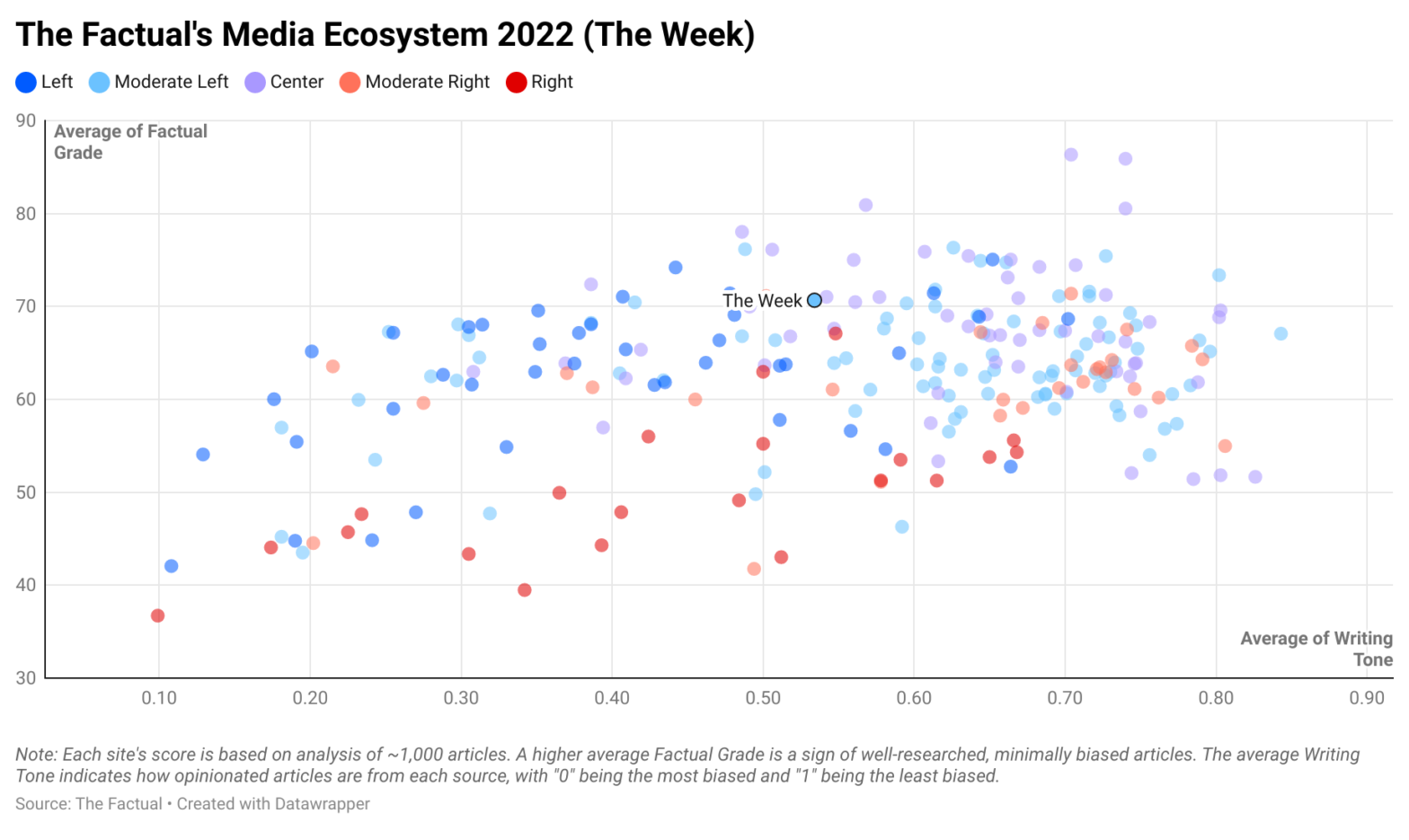The Week is a weekly news magazine with U.S. and UK versions that seeks to give readers “all you need to know about everything that matters.” Within this expansive mission, the publication offers analysis on topics in politics, culture, and business, usually delivered with cartoons and caricatures of politicians and recent major events. So, how reliable is The Week and how biased is its content?
How Does The Factual Rate News Sources?
The Factual analyzes more than 10,000 news stories every day to help readers find the most informative, least-biased articles. Our news-rating algorithm scores each article along four metrics: (1) cited sources and quotes, (2) publication history, (3) writing tone, and (4) author expertise. These scores combine in a weighted average we call a Factual Grade, which ranges from 0–100%. (See our How It Works page to learn more about our algorithm.)
For this study, we analyzed ~1,000 articles each from 240 news sources. The average Factual Grade for the entire dataset was 62.5%. Based on these averages, we can compare the performance of news sites across the media ecosystem. The entire dataset can be explored in greater detail here.
How Factual Is The Week?
The Week scored an average Factual Grade of 70.7%, placing it in the 85th percentile of our dataset. The Week scores relatively highly thanks to strong sourcing of information and high author expertise scores. This means that articles from the site often incorporate numerous direct quotations or links to highly rated external sources. Likewise, the site employs dedicated teams of journalists who routinely write on the same topics. As a result, they tend to receive higher author scores, signaling that writers are more likely to bring relevant knowledge and expertise to their stories. As discussed below, scores for The Week are dragged down somewhat by fairly opinionated language.
Like any news source, scores for articles from The Week vary widely based on these factors. For example, some scored above 80%, while others scored below 60%.
Please check your email for instructions to ensure that the newsletter arrives in your inbox tomorrow.
How Opinionated Is The Week?
The Factual measures how opinionated an article is using a sophisticated natural language processing algorithm, producing a score we call the Writing Tone. For this metric, the algorithm looks for signs of subjective commentary (e.g., first person pronouns, unnecessary adverbs), as well as the emotional nature of selected words, and sees how prevalent they are for a given length of text. Text which is less opinionated gets higher ratings, with “0” being the most opinionated and “1” being the most neutral.
The Week had an average Writing Tone score of 0.53, placing it in the 36th percentile in our dataset. This suggests that articles from the site often incorporate opinionated language. Examples can be seen in titles such as “America’s hyperbole habit is the worst thing ever” and “Morality just isn’t Republicans’ thing anymore.”
How Biased Is The Week?
The Factual classifies news sites by political bias as either Left, Moderate Left, Center, Moderate Right, or Right. This classification comes from third-party assessments from media bias organizations such as AllSides and Media Bias/Fact Check (MBFC). Based on this data, The Factual assigns The Week a Moderate Left bias.
AllSides rates The Week as “Lean Left” based on independent research and 7,380 community ratings. In 2020, AllSides split The Week into two separate entities, classifying the news portion of the site as “Center” but the opinion portion as “Lean Left.” That classification changed in June 2021, and now both portions are “Lean Left.” An earlier review, in January 2020, noted that the news site “frequently offers both the left and right perspective and is relatively balanced,” while the opinion section “leans left overall.” Analysis from years prior puts the site routinely on the border between “Lean Left” and “Center.”
MBFC classifies The Week as “Left” based on “story selection that frequently favors the left and strongly left-leaning editorial positions.” They note a tendency to use opinionated language on occasion, as seen in headlines like “How Bernie Sanders would dismantle the American empire” and “Donald Trump is the worst presidential negotiator in history.” MBFC also gives The Week credit for strong sourcing of information and a “reasonable fact check record,” with just one failed fact check in recent memory.
Please check your email for instructions to ensure that the newsletter arrives in your inbox tomorrow.
Who Owns The Week?
The Week is owned by Future plc, a British media company that owns over 50 magazines across a wide range of topic areas. Some of its other assets include Golf Monthly, the New Scientist, and Space.com. Future plc acquired The Week, along with other brands previously under Dennis Publishing Ltd, in 2021. The company claims to reach 1 in 3 adults online in the U.S. and UK.
Why Does It Matter?
News articles always have some bias because all authors have some frame of reference within which they describe a story. Political bias ratings are helpful in understanding this framing. However, it can be more beneficial to know how factual an article is based on quantifiable metrics that can be seen across the media ecosystem, such as cited evidence, author expertise, and writing tone. This is what The Factual ascertains.
Reading several, highly rated articles from across the political spectrum helps counter the bias of any news source or story. To have the day’s most factual news stories delivered to your inbox every morning, subscribe to our daily newsletter.
Article updated on September 22, 2022 to reflect new data.

